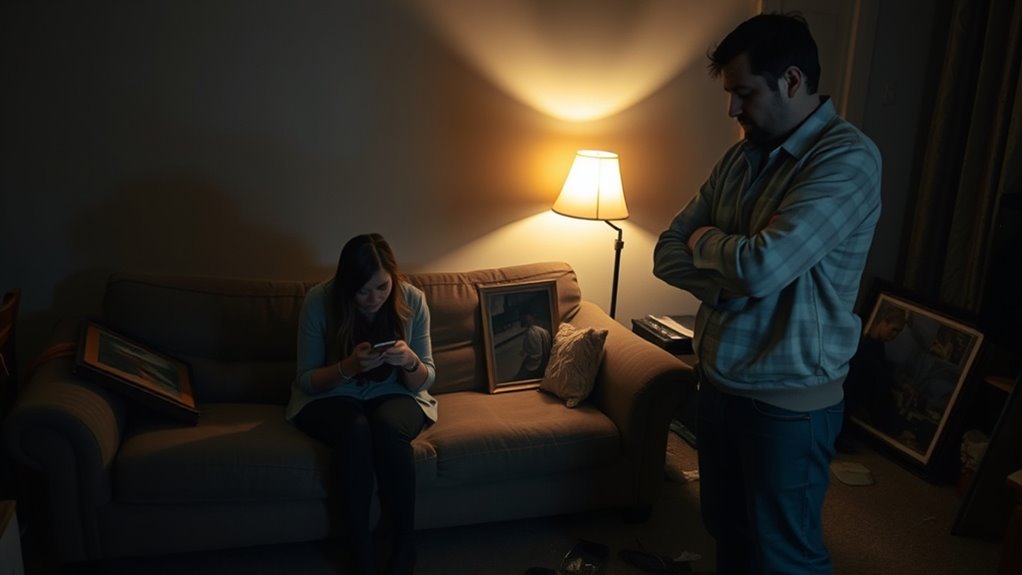If you notice constant distrust, unwarranted suspicion, or emotional manipulation like guilt-tripping or gaslighting, these are serious red flags that your relationship may be toxic. Trust issues combined with controlling behaviors can undermine your confidence and emotional well-being. Recognizing these warning signs early helps prevent ongoing damage. Stay alert—if you pay close attention, you’ll uncover more signs that indicate whether your relationship is healthy or harmful.
Key Takeaways
- Constant suspicion and questioning of motives indicate a breakdown of trust and potential emotional manipulation.
- Making you feel guilty or invalidating your feelings are signs of emotional control and toxicity.
- Gaslighting or twisting situations to serve their interests erodes your confidence and self-esteem.
- Lack of honesty, open communication, and mutual respect point to an unhealthy, manipulative relationship.
- Feeling drained, anxious, or doubting your perceptions after interactions signals emotional exhaustion and red flags.

Have you ever wondered what signs might indicate trouble early on in a relationship? It’s important to pay attention to red flags because they often reveal underlying issues that can escalate if ignored. One of the most telling signs is persistent trust issues. If your partner constantly questions your motives, doubts your honesty, or becomes overly suspicious without reason, it’s a warning sign. Trust forms the foundation of any healthy relationship, and when it’s broken or shaky from the start, it’s a sign that things might not be as they seem. Trust issues can lead to controlling behavior or excessive jealousy, which only fuels further distrust. Don’t dismiss these signals as minor; they often point to deeper insecurities or even manipulative tendencies that could worsen over time. Additionally, predictive analytics in AI can help forecast potential relationship problems by analyzing behavioral patterns over time, providing insights into underlying issues before they become unmanageable.
Another essential red flag to watch for is emotional manipulation. This isn’t always obvious; it can be subtle and insidious. For example, if your partner frequently makes you feel guilty to get their way or dismisses your feelings as invalid, they might be gaslighting you. Emotional manipulation aims to control or influence your perceptions, making you doubt your judgment or feel responsible for their problems. Over time, this erodes your confidence and sense of self. If you notice your partner twisting situations to put themselves in a better light or making you feel responsible for their emotions, it’s a sign they’re trying to manipulate you rather than genuinely connect. Recognizing these tactics early can save you from emotional exhaustion and help you decide whether the relationship is healthy or toxic.
Trust issues and emotional manipulation often go hand in hand. A partner who struggles with trust may resort to emotional control to compensate, creating a cycle of insecurity and manipulation. This cycle can make it difficult to distinguish genuine concern from controlling behavior, but your intuition is key. Pay attention to how you feel after interactions—do you feel respected and valued, or drained and anxious? If emotional manipulation is present, you might start doubting your perceptions or feeling guilty for things that shouldn’t be your responsibility. These are serious red flags. Healthy relationships thrive on mutual respect, honesty, and open communication. When these elements are missing, especially when trust is compromised and emotional manipulation is at play, it’s time to reevaluate. Ignoring these signs can lead to emotional damage, so trust yourself and don’t settle for less than a relationship built on genuine care and respect.
Frequently Asked Questions
How Can I Distinguish Between Minor Disagreements and Serious Red Flags?
When trying to distinguish between minor disagreements and serious red flags, pay attention to communication patterns and emotional boundaries. If your partner dismisses your feelings or consistently crosses boundaries, it signals a red flag. Minor disagreements are resolved through respectful dialogue, while serious issues involve control or manipulation. Trust your instincts—if conflicts feel draining or unsafe, it’s time to reevaluate the relationship’s health and prioritize your well-being.
Are There Red Flags That Appear Only in Specific Relationship Types?
Imagine you’re in a different era, but relationship dynamics still matter. Some red flags, like controlling behavior or dishonesty, are universal. However, others may only appear in specific relationship types, showing red flag variability. For example, in a long-distance relationship, lack of communication might be more alarming. Recognizing these nuances helps you identify red flags specific to your relationship, ensuring you don’t ignore warning signs that vary with context.
When Should I Seek Help or Advice About Relationship Concerns?
When you notice emotional warning signs or communication breakdowns that persist, it’s time to seek help or advice. Don’t ignore feelings of frustration, confusion, or hurt, especially if they happen repeatedly or escalate. If you feel unsafe or overwhelmed, reach out to a trusted friend, counselor, or therapist. Addressing issues early can prevent further damage and help you understand whether the relationship is healthy or needs change.
Can Red Flags Be Signs of Personal Insecurities Rather Than Toxicity?
Imagine red flags as a mirror reflecting deeper issues. Sometimes, these signs stem from insecurities rather than toxicity, signaling personal growth opportunities. You might see jealousy or defensiveness and wonder if it’s about the relationship or their self-esteem. Recognizing the difference helps you approach compassion and understanding, fostering healthier connections. Insecurities can be hurdles, but they’re often a call for empathy, not necessarily a sign of toxicity.
How Do Cultural Differences Influence Perceptions of Red Flags?
Cultural differences shape how you perceive red flags, as cultural norms influence what behaviors seem acceptable or problematic. Your perception biases might lead you to overlook red flags that are more serious in other cultures, or overreact to behaviors that are normal elsewhere. Understanding these cultural contexts helps you evaluate red flags more objectively, ensuring you don’t misinterpret actions based solely on your own cultural background.
Conclusion
Trust your instincts like a lighthouse guiding you through stormy seas. Ignoring red flags is like sailing into treacherous waters blindfolded—dangerous and unwise. Remember, a healthy relationship should feel like a warm, steady fire, not a flickering candle on the brink of extinguishing. Keep your eyes open and your heart protected; don’t let toxicity sneak in disguised as something else. You deserve a love that’s safe, bright, and truly nourishing.










